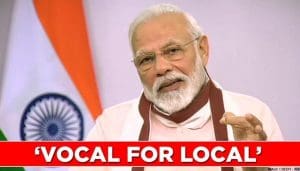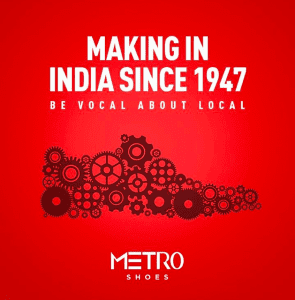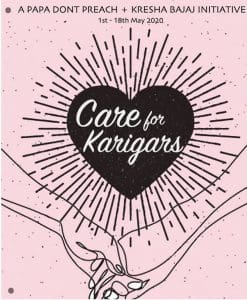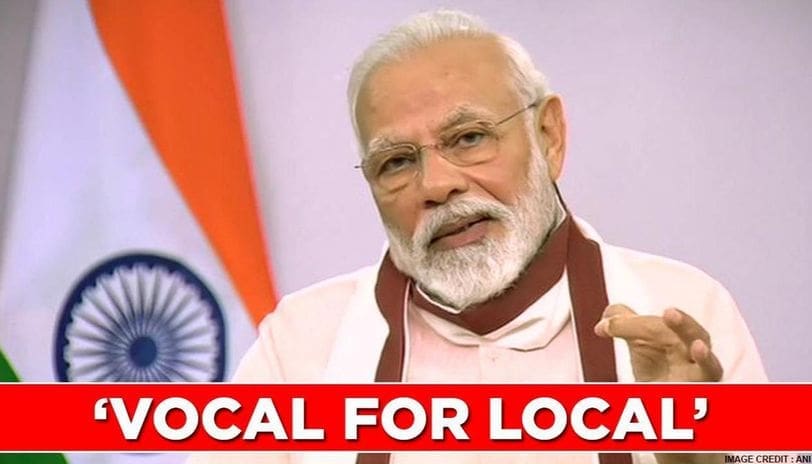Covid-19 has resulted in unemployment and bankruptcy rates being skyrocketed as the stores have been shut for safety purposes. Textile and apparel industry, being the second largest industry in India was bound to get affected by the pandemic. While it caused damage to large brands as well, the smaller ones had to take a major blow. Independent designers incurred immense damage since they operate on a low budget and usually invest the gains of the last season into their next season’s collection. Therefore, a major sales disruption due to the pandemic interrupted their cash flow, further affecting the entire business. According to an article, a New Delhi based designer, Karan Torani who owns a flagship store in Khan market requested his customers to contribute towards salary fund through his social media. The amount paid would be considered a future payment towards any purchases made at his label. Stating that he had to halt the operations indefinitely and talking about embroiderers, printers, tailors, finishers and other people involved, he said, “ the people who stand to lose right now are those who make the clothes you love. He further mentioned that a few of his loyal customers reached out to him and placed advanced orders but sadly it isn’t enough for the 250 employees and is clueless about how long the funds will last.
VOCAL FOR LOCAL: Now, more than ever, local businesses and local craftsmen need our support to sustain this economic setback. They need to bounce back and get more efficient and stronger than before. Businesses will have to come out with new ideas, alterations in the way they function and with sustainability at the core of their business. They might have to utilize their last season’s inventory in order to minimize waste and work on their pricing strategies in order to make up for the loss. Putting the collection on sale and providing complimentary masks or masks marked at decent prices might be useful for both, businesses and consumers.
Prime Minister Narendra Modi addressed the nation on the future course of action for India’s fight against the deadly Coronavirus, where he suggested that we must support local brands as they have been hard-hit by the lockdown. He emphasized that every Indian must become “vocal for our local”.

Fashion designer, Sandeep Khosla says, “We must recover our losses so that we continue to flourish as designers, as employers, as custodians of craftsmanship. That recovery and regeneration cannot happen without ‘Be Indian, Buy Homegrown’ becoming the motto and practice of buyers.”
Another eminent designer, Tarun Tahiliani, in one of his interviews says, “It is a creator’s job every once in a while to look inwards and remind themselves what they stand for. To look at this period of social distancing as a time to reflect on one’s actions and make better choices is an opportunity in disguise. Tahiliani signs off on a wise note, “someone said to me our grandparents went to war and survived the Partition. We have been asked to sit at home, wash our hands and stay calm. Keep things in perspective. Count your blessings. Look after those who depend on you—this will take sacrifice from all.”
Fashion designer, Rahul Mishra, in an interview with Cosmopolitan says, “During the lockdown, people are learning the importance of resources and must learn to use them more wisely. Local fashion in India comprises a variety of unique crafts and art forms that have been sustained through centuries by small communities of people. Lives of many such craftsmen and those of their families depend of the sale of their goods. While it is important for us to sustain our culture along with these crafts, it is also our responsibility as humans to support their small businesses and help them survive this pandemic. A consumer must make mindful choices when purchasing and should invest in fashion goods that hold values such as longevity, durability and beauty. This kind of a product will remain relevant for more than a season.”



Rahul Mishra’s Collection “Home”, showcased at Paris fashion Week
Rahul Mishra became the first Indian designer to be invited to present his collection at Paris Fashion Week. The collection was called, ‘Home’ and its beautiful hand embroidery and intricate hand appliqué on sophisticated and simple shapes was an ode to Indian fine craftsmanship. The designer has a workforce of 1,000 people who work with him directly and indirectly. He hopes that this pandemic serves as a catalyst for #MakeInIndia. “Fashion and craft have sustained over centuries of wars, political unrest, natural disasters and epidemics and fashion has always surfaced as the ‘romance’ of the time. It is the response, the natural reaction to a crisis.”
Talking about the buying habits which will be evident after Covid-19, designer Rahul Mishra says, “Post this crisis, the consumer will find themselves as part of a new consumption pattern that will be driven by more sentiment and sensitivity. The market should and will depend less on trends; only the clothing that can sustain in someone’s wardrobe for years to come would be required. This is because the people are learning the importance of resources and are willing to use them more wisely.”
Apart from fashion designers, various Indian brands have also been coming up with creative in support of “Vocal for Local”. Some of them are Parle-G, Jumbo King, Frooti, Swadeshi, Metro shoes and Balaji.




FINANCIAL SECURITY AND HELP PROVIDED BY INDIAN DESIGNERS AND THE FASHION DESIGN COUNCIL OF INDIA:
Karigars, artisans, tailors etc. are the ones who have been facing serious repercussions of pandemic and lockdown. Therefore, Indian designers have come forward to support them by ensuring financial security and well-being. Designer Sabyasachi Mukherjee put out a statement on his Instagram page announcing that he sent all his employees on indefinite leave and they still will be receiving their salaries regardless of their ability to work from home.
Similarly Mumbai based designer, Anita Dongre announced the creation of a company fund of Rupees 1.5 Crores in order to help small vendors, self-employed artisans and others who do not have medical insurance.
A joint initiative by labels Papa Don’t Preach and Kresha Bajaj, Care For Karigars aims to help sustain the livelihoods of craftsmen affected by the ongoing pandemic. As part of the initiative, designer Kresha Bajaj has created a limited edition cape and her iconic belt and designer Shubhika Davda os Papa Don’t Preach is offering an embroidered belt bag, each priced at Rs 5,000. All proceeds from the sale of these items will be donated to craftsmen.


The Fashion Design Council of India has initiated a support fund in order to support small businesses and young entrepreneurs by providing financial assistance amid the coronavirus pandemic. Textiles minister, Smriti Irani put up a video message, appreciating FDCI’s initiative. “The Indian fashion industry is the pride of the Indian textile industry. Today those who weave dreams onto a cloth are weaving together a support group. My gratitude to the Fashion Design Council of India, ably led by Sunil Sethi, for coming up with a COVID-19 fund. “I’m hopeful that the fund which will come together with the assistance of designers, design houses and other organisations affiliated to them will help us tide through these challenging times,” Irani said in her video message.

WHY DO WE NEED TO GO LOCAL?
Shopping from local brands has a major impact on the economy as it helps to increase job opportunities. This is also beneficial in keeping our traditional crafts alive and therefore leading to more startups. This will effectively diversify the current commercial market consumers are accustomed to. Shopping from local brands can help small businesses to sustain coronaviruses’ economic blow to an extent.
HOW CAN WE SUPPORT LOCAL BRANDS AND BUSINESSES?
- Promote local brands through social media by following them and sharing their posts so that they get more views and therefore, more customers.
- You can buy gift cards for yourself, your friends and family, which can be utilized once the lockdown gets lifted.
- Go for online yoga classes or even courses in order to support virtual businesses as well.
- Donate directly to the brands
- Shop online since it’s not possible for us to step out of our houses. The brands have switched to e- retailing so try and support them to make ends meet.
- Review your favorite local brands so that they gain more customers
INTERVIEW by Vasavi Mehta, Fashion Value Chain : SHIVANGI LAHOTY, Founder and Creative Director, Inaaya and Co.

Ahmedabad and Mumbai based fashion designer, Shivangi Lahoty runs her own prestigious brand which goes by the name, Inaaya and Co. Her brand works with fabrics that are sourced from Kolkata, Bhagalpur, Kota, Maheshwar and Hyderabad. Inaaya and Co. is a brand that stands up for ethical fashion and has incorporated upcycling as the brand’s identity. They offer everything from western wear to tasseled earrings, scarves and handmade jewelry. Mithila Palkar, Mallika Dua and Swara Bhaskar are some of the celebs who have been spotted wearing the brand. When it comes to apparel, Inaaya has made it a point to use organic fabrics like handloom silks, linens, khadi and mal, therefore making them a sustainable brand.



Inaaya & Co.
Shivangi Lahoty, in conversation with Fashion Value Chain, explains the need for us to go local and how Inaaya and Co has been mitigating the economic loss.
Question 1: Why do you think there is a need for us to go vocal for local?
Answer: Small and micro businesses will thrive only when instead of spending their hard earned money on international goods, consumers switch to supporting the economy of our nation by shopping local brands.
Question 2: According to you, what are the ways that consumers can support local designers so that can be beneficial for a brand to sustain during this crisis?
Answer: Nothing works as good as word of mouth. Market designers and brands you believe in within your friends circle. Help them sustain by shopping from them and supporting them financially.
Question 3. How did this pandemic affect your business and what steps did you have to take to keep your brand going?
Answer : The covid situation has affected business to a great extent. Events and offline pop-ups which are the backbone of our business have stopped. We had to let go of our studio last week in Ahmedabad because retail is greatly affected and we do see that it is an additional expense we were incurring with no returns for more than three months now. Well, currently we are offering huge discounts to liquidate stock and keep the customers engaged to our products and also help our weavers sustain.
You can check them out on their Instagram and facebook pages. DM them to place your orders :
Contact : 09619273711
Email : inaayandco@gmail.com
Instagram : https://www.instagram.com/inaayandco/
Facebook : https://www.facebook.com/inaayandco/

By Vasavi Mehta
References and Image courtesy:
Supporting local brands: Why it’s important – The Chic Daily
7 ways to support small local fashion brands right now
How to support small businesses during this pandemic
‘Vocal For Our Local’: PM Modi’s Mantra to Make Local Brands Global | India.com
https://www.instagram.com/lahotyshivangi/

